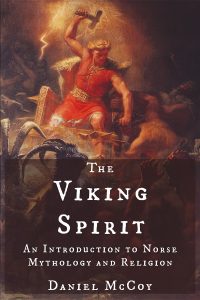
The einherjar (pronounced “ane-HAIR-yar,” with the first syllable like “sane” without the “s”; Old Norse einherjar, literally “those who fight alone”[1]) are the band of the spirits of deceased elite warriors who dwell in Valhalla, the magnificent hall of the god Odin. Noble Viking warriors aspired to become one of the einherjar after they died.
The lifestyle of the einherjar would have been the envy of living Vikings. All day long, they fight one another, doing countless valorous deeds along the way. But every evening, all their wounds are healed, and they are restored to full health.[2] They surely work up quite an appetite from all those battles, and their dinners don’t disappoint. Their meat comes from the boar Saehrimnir (Old Norse Sæhrímnir, whose meaning is unknown[3]), who comes back to life every time he is slaughtered and butchered. For their drink they have mead that comes from the udder of the goat Heidrun (Old Norse Heiðrun, whose meaning is unknown[4]). They thereby enjoy an endless supply of their exceptionally fine food and drink.[5] They are waited on by the beautiful Valkyries.
But Odin doesn’t keep the einherjar around just so they can enjoy extravagant pleasures. He has a particular purpose in mind for them, and they’ve all been carefully selected to fulfill this purpose. At Ragnarok, the final battle between the gods and the giants, Odin is fated to fight the dreadful wolf Fenrir. The einherjar will fight valiantly by his side. But despite all their fearless efforts, they are doomed to fall with their master – and with the rest of the cosmos as well, for that matter.[6]
The name “those who fight alone” is confusing, since nowhere in the sources do the einherjar fight alone (that is, in single combat) in any significant context. Philologist Rudolf Simek speculates that the name may be derived from an older root that meant “those who belong to an army,”[7] which would make more sense.
Looking for more great information on Norse mythology and religion? While this site provides the ultimate online introduction to the topic, my book The Viking Spirit provides the ultimate introduction to Norse mythology and religion period. I’ve also written a popular list of The 10 Best Norse Mythology Books, which you’ll probably find helpful in your pursuit.
References:
[1] Simek, Rudolf. 1993. Dictionary of Northern Mythology. Translated by Angela Hall. p. 71.
[2] The Poetic Edda. Vafþrúðnismál, stanza 41.
[3] Simek, Rudolf. 1993. Dictionary of Northern Mythology. Translated by Angela Hall. p. 273.
[4] Simek, Rudolf. 1993. Dictionary of Northern Mythology. Translated by Angela Hall. p. 135.
[5] The Poetic Edda. Grímnismál, stanzas 18, 25, and 36.
[6] The Poetic Edda. Grímnismál, stanza 23.
[7] Simek, Rudolf. 1993. Dictionary of Northern Mythology. Translated by Angela Hall. p. 71.

